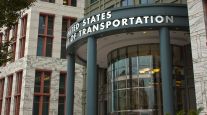Staff Reporter
FHWA Awards $15.1 Million for Alternative Funding Pilot Projects

[Stay on top of transportation news: Get TTNews in your inbox.]
The Federal Highway Administration has awarded $15.1 million in Surface Transportation System Funding Alternatives grants.
Created through the Fixing America’s Surface Transportation Act of 2015, the program supports states that are exploring user-based revenue mechanisms. The funding, announced July 9, represents seven projects in Delaware, Oregon, Utah, Washington and Wyoming.
The projects will evaluate miles-based user fees (MBUF) and road user charges. The MBUF system requires technology to tabulate how far a vehicle has traveled, information that helps determine how much it is charged.
“These seven pilot projects will help provide valuable insight into potential new sources of revenue to support highway and bridge improvements nationwide,” Federal Highway Administrator Nicole Nason said.

Nason
The largest grant, for $5.5 million, was issued to the Washington Department of Transportation, which has partnered with the Washington State Transportation Commission on a road-usage charge demonstration project.
Also, $5 million was awarded to the Oregon Department of Transportation to pursue a project related to road usage charging in a connected vehicle ecosystem. The agency’s second award, for $250,000, will support the Western Road User Charge Consortium and will explore the potential of blockchain. Known as RUC West, the consortium is an initiative to develop road-usage charge programs.
“We are very excited to be grant recipients,” said Maureen Bock, chief innovation officer for ODOT. “We value the partnerships we have with FHWA and the other RUC West states.”
Oregon was a pioneer of the road-usage charge system. The state’s Road User Fee Task Force started conducting per-mile charging pilot programs in 2007.

How can fleet managers harness technology to get a better handle on vehicle speed and improve their safety culture? Host Seth Clevenger speaks with Mathieu Boivin of E-Smart and Jonathan Hubbard of SpeedGauge. Hear a snippet, above, and get the full program by going to RoadSigns.TTNews.com.
The Delaware Department of Transportation and the I-95 Corridor Coalition together received $3.3 million to address MBUF barriers through expanded pilot deployments within the coalition’s states. Additionally, the coalition is partnering with ERoad to deploy a truck pilot program that is meant to develop solutions to help determine if the MBUF system is a viable funding approach at the state and federal levels.
“We are very excited to continue our important work examining mileage-based user fees, especially at a time when funding is at the forefront of everyone’s mind and all levels of government and policymakers are searching for answers,” said Patricia Hendren, executive director of the I-95 Corridor Coalition. “This grant gives us a chance to assess potential concerns of key stakeholders and how MBUF would affect people who drive to meet their daily needs, such as getting to work or school, as well as commercial truck drivers who play a critical role in our supply chain.”
FHWA today awarded $15.1 million in Surface Transportation System Funding Alternatives grants to seven projects in five states to explore new ways to fund highway and bridge projects. https://t.co/QzTEA7mRSB #Infrastructure — Federal Highway Admn (@USDOTFHWA) July 9, 2020
The Wyoming Department of Transportation received $250,000 to pursue a truck-mileage, user-fee pilot program.
The Utah Department of Transportation received two grants, one for $395,000 to support the integration of road user charges and express lane tolling and one for $350,000 to help cover local road-usage charge costs.
Many states are pursuing infrastructure-funding mechanisms to counterbalance the flagging federal Highway Trust Fund, which helps states with construction and maintenance projects and relies heavily on the federal fuel tax.
The federal fuel tax has stagnated at 24.4 cents a gallon for diesel and 18.4 cents a gallon for gasoline since 1993. Improvements in fuel consumption and shifting driving habits contribute to the account’s steady decline, prompting several general fund transfers in recent years to maintain its solvency.
Want more news? Listen to today's daily briefing:
Subscribe: Apple Podcasts | Spotify | Amazon Alexa | Google Assistant | More




